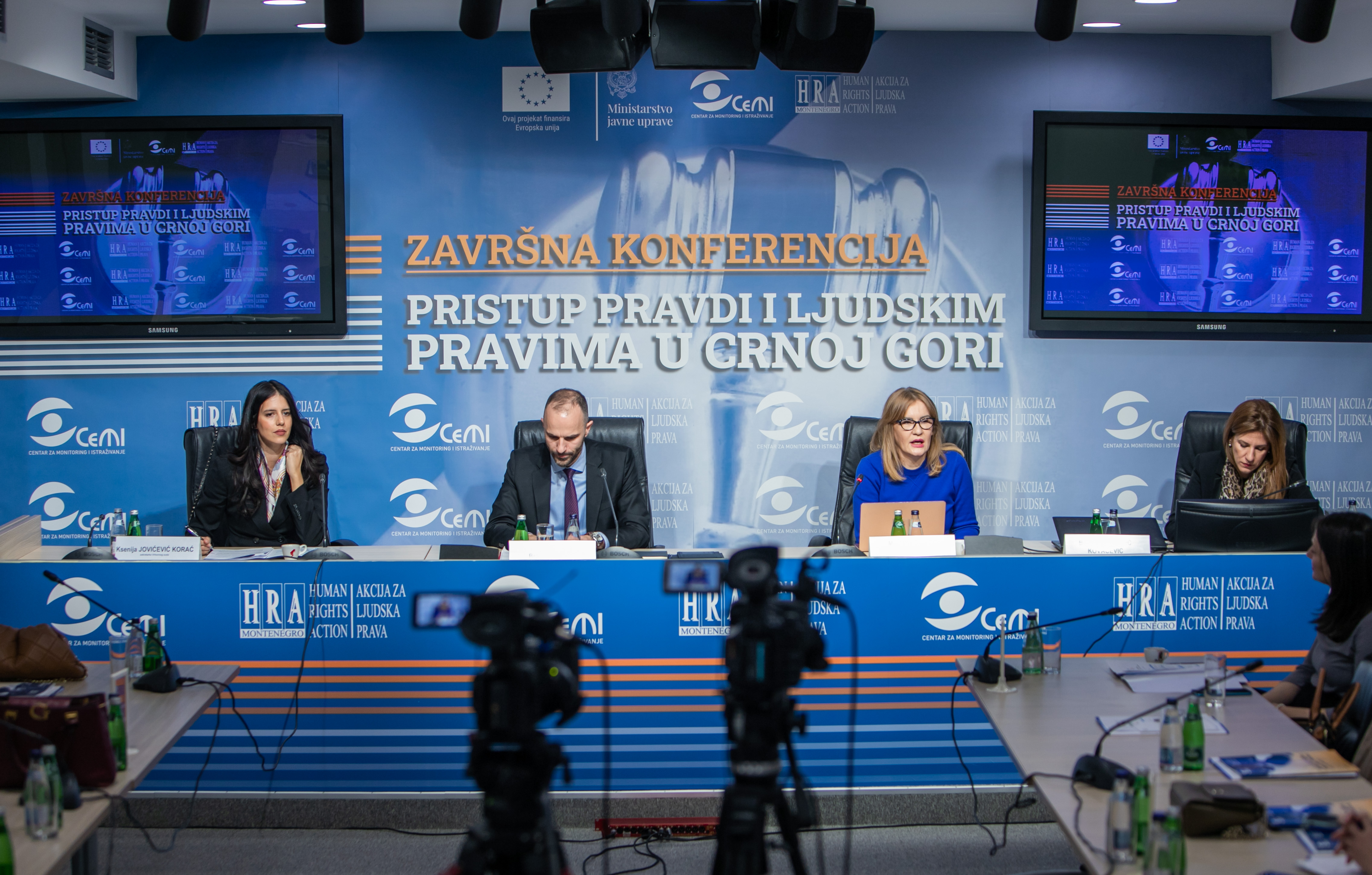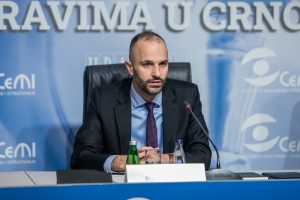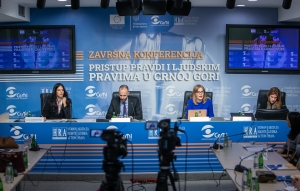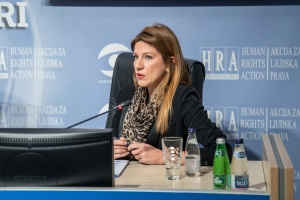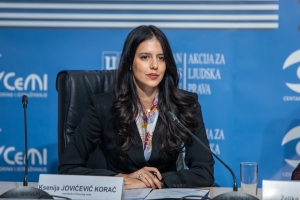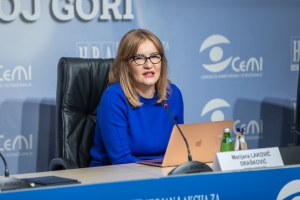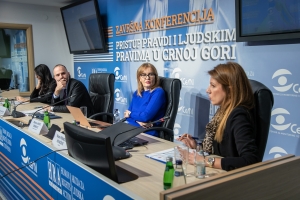The information system of the Ministry of Justice for recording cases related to international legal assistance, Luris, needs to be improved and integrated with a new judicial information system. It is also essential to continuously train personnel in handling new legal instruments and the English language.
This message was conveyed during the panel discussion on "International Legal Assistance in Criminal Matters," held as part of the concluding conference "Access to Justice and Human Rights in Montenegro," organized by the Center for Monitoring and Research (CeMI).
Lawyer and author of the Study on the System of International Legal Assistance in Criminal Matters in Montenegro, Marijana Laković-Drašković, stated that in the reports of the European Commission, international judicial cooperation in criminal matters is not identified as a problematic issue. She mentioned that assessments have been further improved following Montenegro's collaboration with Eurojust.
"Lots of obligations lie ahead for Montenegro in terms of amending national legislation and ratifying international instruments concerning the entire system of international legal assistance, both in civil and criminal matters. Two Hague Conventions are of great importance," noted Laković-Drašković.
She also pointed out the limited capacities of the Ministry of Justice in managing cases, the availability of information with integrity, and the analysis of cases of international legal assistance, including the supporting information system.
"Overall, the establishment of an information system in the judiciary, including the Ministry responsible for judicial affairs, will contribute to the transparency, accountability, and efficiency of the judicial system," said Laković-Drašković.
She pointed out that over the past eight years, this information system has not undergone significant technical changes that would result in better management of international legal assistance cases and analysis of the actions of the Ministry of Justice and relevant judicial authorities.
"The already imposed need for frequent international judicial cooperation necessitates the prioritization of abandoning the concept of traditional (basic) data collection and focusing on a reliable electronic system that will store data in a qualitative and quantitative sense," said Laković-Drašković.
She mentioned that, for the purposes of the study, five cases were analyzed, along with extensive documentation made available to observers by the Higher Court in Podgorica through CeMI.
"The court records were analyzed to gain a closer insight into the court's proceedings within the jurisdiction outlined by the Law on International Legal Assistance in Criminal Matters, particularly when deciding on extradition requests for accused or convicted individuals from requesting states," explained Laković-Drašković.
She pointed out that, in the analysis of four cases, the investigating judges considered that conditions were met to issue resolutions confirming the fulfillment of extradition conditions, providing appropriate justifications in the documents forwarded to the judicial councils.
"The councils made decisions that were in line with the opinions of the investigating judges, and there were no deviations regarding decisive facts about the fulfillment of conditions. The same situation occurred when the request for the extradition of one individual was rejected. The case files do not indicate any shortcomings in communication between the competent authorities of Montenegro and the competent authorities of the requesting states," stated Laković-Drašković.
She said it can be concluded that the court decisions are sufficiently reasoned.
"In the analyzed court decisions, it was not observed that judges applied the practice of the European Court of Human Rights or the standards from the Convention Against Torture and Other Cruel, Inhuman, or Degrading Treatment or Punishment. On the other hand, there was no indication that the defense of the individuals whose extradition was sought asserted that the accused person had been subjected to torture in the requesting state, which would warrant an appropriate response from the court," said Laković-Drašković.
According to her, after considering preliminary opinions expressed in the expert community and analyzing the provisions of national laws and international treaties, and given the fact that it is still unknown whether fighters against organized crime have had substantial benefits from accessing materials obtained through protected communications, it is expected that national judicial authorities will follow the views and decisions of the European Court of Human Rights and the Court of Justice of the European Union, which enjoy authority in the Montenegrin legal system.
"In the meantime, it is expected that the courts will consult the practices of courts in the region regarding the admissibility of evidence," said Laković-Drašković.
The Director-General of the Directorate for International Legal Cooperation at the Ministry of Justice, Branimir Janjević, believes that Montenegro has a quality legislative framework for international legal assistance in both civil and criminal matters, but he also sees room for improvement.
"In the past years, for the current year, and for the upcoming year, we have planned improvements to the legislative framework and the introduction of new multilateral agreements. Primarily, the two Hague Conventions – on the protection of adults and the recognition of judgments in civil and criminal matters. This is a novelty that will enrich the legislative framework, especially from the perspective of civil legal assistance," said Janjević.
He explained that Montenegro, according to the international law, has the ability to recognize foreign judgments in civil and commercial matters, noting that the main drawback is that Montenegrin judgments of the enforcement court are not recognized abroad.
"We need to ratify the third and fourth additional protocols concerning the European Convention on Extradition, which we have planned for the next year," added Janjević. He emphasized the importance of continuous training for personnel regarding new legal instruments and the English language. Additionally, he highlighted the significance of integrating the Luris system not only with the judiciary but also with the state prosecutor's office.
Representative of the Montenegro Bar Association, lawyer Bojana Franović-Kovačević, stated that the issue of international legal assistance in criminal matters is crucial for Montenegro.
"International legal assistance is extremely important for us as a society to move forward and to achieve minimum standards of human rights respect. We cannot do it without the international community," said Franović-Kovačević.
According to her, the issue of international legal assistance is simultaneously very complex. She expressed the opinion that the judicial system in Montenegro is not mature enough to cope with the current influx of information and everything that is happening in a way that would meet minimum standards.
"We, as lawyers, often lack sufficient computer literacy and do not have enough knowledge of the English language. The problem becomes systemic the moment the information on international legal assistance enters Montenegro when you realize that at several levels, there is a breakdown in functioning, whether it's technical or due to a lack of knowledge," Franović-Kovačević stated.
The conference was organized within the project "Access to Justice and Human Rights in Montenegro – Trial Monitoring Project 2021-2023," implemented by the Center for Monitoring and Research (CeMI) in collaboration with the Human Rights Action (HRA). The project is funded by the European Union and co-financed by the Ministry of Public Administration of Montenegro.
